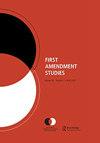The First Amendment v. reproductive rights: Crisis pregnancy centers, commercial speech, and marketplaces of misinformation
Q2 Social Sciences
引用次数: 0
Abstract
ABSTRACT This essay responds to the holding in National Institute of Family and Life Advocates (NIFLA) v. Becerra (2018), arguing that the signal contribution of the majority opinion is its attempt to move commercial speech further into the absolute realm of protected public discourse. In finding the California FACT Act to be unconstitutional, the 5–4 majority uses a fractured commercial speech standard to define NIFLA’s marketplace communications as protected ideological speech. In so doing, Justice Thomas, author of the majority opinion, considers only the state’s speech – its compelled disclosures – and does not assess the rhetorical properties of NIFLA’s commercial communications. But the majority concludes nevertheless that NIFLA’s speech is impervious to publicly interested legislation, despite well-documented evidence of misleading and harmful advertising. Ultimately, it is argued that the question of whether NIFLA’s right to free speech has been violated cannot be squarely addressed if the speech with which the state’s disclosures dialogue remains nebulous. NIFLA seems to undermine the longstanding conception of commercial speech as a form that legitimates both the interests of speakers and the informational interests of publics, with the latter sustained when necessary by governmental initiatives that enable informed choice-making by regulating deceptive information in commercial marketplaces.第一修正案诉生殖权利:危机怀孕中心、商业言论和错误信息市场
摘要本文回应了美国国家家庭与生活倡导者协会(NIFLA)诉Becerra(2018)一案的判决,认为多数意见的标志性贡献是它试图将商业言论进一步带入受保护的公共话语的绝对领域。在认定《加州事实真相法案》违宪的过程中,5–4的多数人使用了一个支离破碎的商业言论标准,将NIFLA的市场传播定义为受保护的意识形态言论。在这样做的时候,多数意见书的作者托马斯大法官只考虑了该州的言论——其强制披露——而没有评估NIFLA商业通信的修辞性质。但大多数人得出的结论是,尽管有充分的证据表明存在误导和有害的广告,但NIFLA的言论不受公众关注的立法的影响。最终,有人认为,如果国家披露对话所用的言论仍然模糊不清,那么NIFLA的言论自由权是否受到侵犯的问题就无法得到正视。NIFLA似乎破坏了商业言论的长期概念,商业言论是一种使演讲者的利益和公众的信息利益合法化的形式,后者在必要时通过政府举措得以维持,通过监管商业市场中的欺骗性信息来实现知情选择。
本文章由计算机程序翻译,如有差异,请以英文原文为准。
求助全文
约1分钟内获得全文
求助全文
来源期刊

First Amendment Studies
Social Sciences-Law
自引率
0.00%
发文量
0
期刊介绍:
First Amendment Studies publishes original scholarship on all aspects of free speech and embraces the full range of critical, historical, empirical, and descriptive methodologies. First Amendment Studies welcomes scholarship addressing areas including but not limited to: • doctrinal analysis of international and national free speech law and legislation • rhetorical analysis of cases and judicial rhetoric • theoretical and cultural issues related to free speech • the role of free speech in a wide variety of contexts (e.g., organizations, popular culture, traditional and new media).
 求助内容:
求助内容: 应助结果提醒方式:
应助结果提醒方式:


